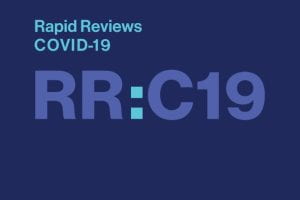The emergence of the COVID-19 pandemic has presented numerous, extraordinary challenges which have greatly altered our everyday lives. This public health crisis has led to a demand for information as there is a universal desire for solutions to the problems of protecting ourselves from the virus and curing those who have been infected. As research efforts have accelerated to meet these demands there has been a growing tension as the desire for quick, potentially lifesaving information has led to the spread of inaccurate or misunderstood reports which have been seized upon by large portions of the lay public. This tension within the scientific world between speed and certainty is not new, but the current pandemic has made it more obvious to all.
The world of scientific publishing is notoriously slow and deliberate, as processes like peer-review have long provided a check on the flow of scientific information to ensure quality before the results of research are disseminated to the wider scientific community and ultimately to the public. However during this ongoing crisis, there has been a rise in the publication of pre-prints (i.e., manuscripts which have not undergone formal peer review) as researchers try to get their potentially life-saving information into the hands of clinicians and policy makers as soon as possible. Pre-print services, such as ArXiv in the physics community, have existed for a long time, but they are now receiving more attention than ever.
 In an effort to add a gate-keeper function to the growing world of COVID-19 related pre-prints, MIT Press and the University of California have developed Rapid Reviews: COVID-19, a so-called “overlay journal”, whose function is to sift through the most popular COVID-19 related pre-prints and provide a form of peer-review. This differs from the traditional publishing model as the pre-prints will be selected by editors of the journal as opposed to being directly submitted by the authors themselves. In fact, though authors will be informed that their work has been selected for review by the journal, they will not have a say in whether their pre-print is reviewed or not. Additionally this journal will differ from others in that the identities of the reviewers will be made known, which will hopefully encourage thoughtful and careful reviews.
In an effort to add a gate-keeper function to the growing world of COVID-19 related pre-prints, MIT Press and the University of California have developed Rapid Reviews: COVID-19, a so-called “overlay journal”, whose function is to sift through the most popular COVID-19 related pre-prints and provide a form of peer-review. This differs from the traditional publishing model as the pre-prints will be selected by editors of the journal as opposed to being directly submitted by the authors themselves. In fact, though authors will be informed that their work has been selected for review by the journal, they will not have a say in whether their pre-print is reviewed or not. Additionally this journal will differ from others in that the identities of the reviewers will be made known, which will hopefully encourage thoughtful and careful reviews.
It is hoped that this effort will provide some of the benefits of the traditional peer-review process without significantly slowing the dissemination of important, life-saving information during this time of crisis. It will be interesting to see if efforts like this can lead to more long-lasting changes in the world of scholarly communication when our current time of crisis has passed.


